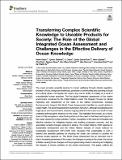Por favor, use este identificador para citar o enlazar a este item:
http://hdl.handle.net/10261/321593COMPARTIR / EXPORTAR:
 SHARE SHARE
 CORE
BASE CORE
BASE
|
|
| Visualizar otros formatos: MARC | Dublin Core | RDF | ORE | MODS | METS | DIDL | DATACITE | |

| Título: | Transferring Complex Scientific Knowledge to Useable Products for Society: The Role of the Global Integrated Ocean Assessment and Challenges in the Effective Delivery of Ocean Knowledge |
Autor: | Evans, Karen; Zielinski, Tymon; Chiva, S.; García-Soto, Carlos; Ojaveer, Henn; Ruwa, Renison; Schmidt, J.O.; Simcock, Alan; Strati, Anastasia; Vu, C. T. | Palabras clave: | Centro Oceanográfico de Santander world ocean assessment Medio Marino Ocean literacy science-policy interface sustainable development goals ocean management |
Fecha de publicación: | 10-jun-2021 | Citación: | Frontiers in Environmental Science, 9. 2021: 626532-1-626532-9 | Resumen: | The ocean provides essential services to human wellbeing through climate regulation, provision of food, energy and livelihoods, protection of communities and nurturing of social and cultural values. Yet despite the ocean’s key role for all life, it is failing as a result of unsustainable human practices. The first global integrated assessment of the marine environment, produced by the United Nations under The Regular Process for Global Reporting and Assessment of the State of the Marine Environment, including Socioeconomic Aspects (the World Ocean Assessment), identified an overall decline in ocean health. The second assessment, launched in April 2021, although recognising some bright spots and improvements, stresses ongoing decline in the ocean as a result of many unabated anthropogenic stressors on the ocean. This highlights that society, as a whole, does not fully recognise or value the importance of the ocean to their lives and impacts on the ocean caused by human activities. Further, recognition of the need for immediate and effective solutions for mitigating impacts and enabling ecosystem recovery, and the associated societal changes required is lacking. The United Nations 2030 Agenda for Sustainable Development and the United Nations Decade of Ocean Science for Sustainable Development 2021–2030 both recognize that sustainability is both a desired and essential pathway for ensuring the ocean can continue to provide the services society depends on. The World Ocean Assessment has an important role to play in increasing awareness of the ocean, the changes occurring in the ocean, the human activities causing those changes and the progress being made in reducing and mitigating the impacts of human activities on the marine environment. This paper outlines the knowledge brokering role that the Regular Process provides on ocean issues to all aspects of society from policy makers, ocean managers, ocean users to the public. It identifies the challenges faced by the Regular Process in successfully carrying out that role and lessons learned in achieving widespread uptake and recognition. Within the Decade of Ocean Science for Sustainable Development, solutions in the form of instructions or guidelines for the use of the assessment can be developed and implemented. | Versión del editor: | https://www.frontiersin.org/articles/10.3389/fenvs.2021.626532/full | URI: | http://hdl.handle.net/10261/321593 | DOI: | 10.3389/fenvs.2021.626532 | ISSN: | 2296-7745 |
| Aparece en las colecciones: | (IEO) Artículos |
Ficheros en este ítem:
| Fichero | Descripción | Tamaño | Formato | |
|---|---|---|---|---|
| Evans et al (2021).pdf | Articulo principal | 618,63 kB | Adobe PDF |  Visualizar/Abrir |
CORE Recommender
SCOPUSTM
Citations
3
checked on 25-abr-2024
WEB OF SCIENCETM
Citations
3
checked on 24-feb-2024
Page view(s)
23
checked on 12-may-2024
Download(s)
24
checked on 12-may-2024
Google ScholarTM
Check
Altmetric
Altmetric
Este item está licenciado bajo una Licencia Creative Commons

